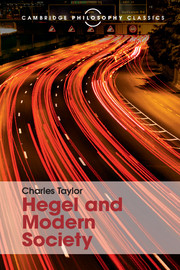2 - Politics and alienation
Published online by Cambridge University Press: 05 November 2015
Summary
The continuing conflict
To understand why Hegel's philosophy remains interesting and relevant today even though his ontology of Geist is close to incredible, we have to return to the discussion of the opening section.
I argued there that Hegel's work arose out of the attempt to combine the two aspirations of Romantic generation, the aspiration to radical autonomy on one hand, and to expressive unity with nature and within society on the other. But these two aspirations, and the hope of combining them, have remained important in our civilization.
This is not surprising. These two aspirations, as we saw, arose as reactions to the mainstream of Enlightenment thought and sensibility. This was utilitarian in its ethical outlook, and atomistic in its social philosophy. It looked on nature and society as having only instrumental significance; they were seen as potential means to the satisfaction of human desire and nothing more. And its hope was to bring men happiness through perfect mutual adjustment by reorganizing man and society according to the principles of a scientific social engineering.
But the industrial, technological and rationalized civilization which has grown up since the eighteenth century has in an important sense entrenched in its practices and institutions the conception of man which belonged to the main trend of the Enlightenment. And this, as it were, against the protests of Romanticism, which combined within itself in one form or another both the expressivist and the autonomist currents of reaction to the Enlightenment. The technology of industrial society pushes to a more and more extensive subjugation of nature. But what is much more important, industrial civilization has enforced repeated reorganizations of society and men's way of life in the name of efficiency and higher production. Urbanization, factory production, depopulation of the countryside and sometimes whole regions, mass emigration, the imposition of a rationalized, rigidly measured pace of life at the expense of the former seasonal rhythm; all these changes and others, whether induced by planning or arising through the hazards of the market and investment patterns, are explained and justified by their greater efficacy in meeting the goals of production.
- Type
- Chapter
- Information
- Hegel and Modern Society , pp. 67 - 130Publisher: Cambridge University PressPrint publication year: 2015

